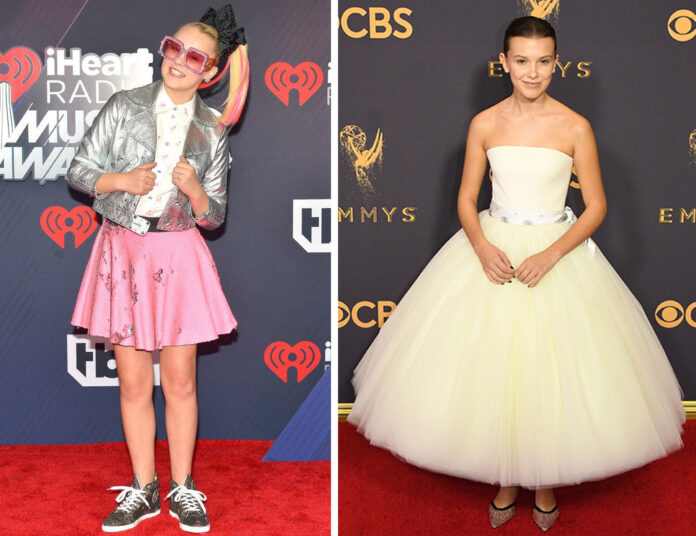Preservation of innocence of child actors while simultaneously hypersexualizing their every move creates vicious cycle
Child actress Millie Bobby Brown sparked controversy at the 26th annual Screen Actors Guild Awards over what she was wearing. Only 15 at the time, Brown was dressed in a low-cut Louis Vuitton coat-dress outfit. While some took to Twitter to criticize her team for dressing her in such a mature manner, others have spewed hate and insults at Brown, judging her character. Some defended the outfit choice and claimed that the 15-year-old should own her sexuality.
“Did people criticize her SAG Awards look for her sake, or because it made them uncomfortable?” questioned an article in Popdust. “In the same way that it is absolutely inappropriate to sexualize Brown, is it not also inappropriate and unfair to forcefully ignore her sexuality completely?
Brown’s team deliberate decision to dress her in such an adult way for a publicized awards show, and the response it elicited from the public, reveals a prominent issue deeply entrenched in the entertainment industry: Young female stars are hyper-sexualized by the business that they are in, then either celebrated or criticized for that same sexualization by the public.
This is no new phenomenon. One of Shirley Temple’s first roles in 1932 was as an exotic dancer in a bar for soldiers in “War Babies.” She was three years old at the time. Throughout her childhood, she was placed in roles that were oddly mature for a young actress. An article in The Guardian analyzes Hollywood’s “Lolita complex” and the ways in which those in charge of Temple’s career exploited the sexualization of her childhood innocence.
“[They figured] out just how to preserve the veneer of innocence while teasing the men who proved her greatest admirers both on and off the screen,” wrote Molly Haskel. “Often orphaned, she finds herself the darling of bachelors, widowers, lonely uncles, in ‘love’ stories that feature non-childlike caresses on both sides.”
The 1994 film “Léon: The Professional” uses a similar trope explained in the article. Natalie Portman, only 12 at the time, played a character who developed an unusual relationship with an older man through a presumed case of Stockholm Syndrome. Despite Portman’s acting merits, the public’s reaction to the film would cause overt sexualisation and harassment that would follow her throughout her career. Portman is open about the horrifying objectification she experienced as a child. Her first fan mail ended up being a rape fantasy story written by a grown man. Later, a local radio station would start a countdown to her 18th birthday.
At the 2018 Women’s March, Portman spoke about the effects of constantly being seen as a sexual object for grown men at such a young age.
“At 13 years old, the message from our culture was clear to me,” she said in her speech. “I felt the need to cover my body and to inhibit my expression and work in order to send my own message to the world: That I’m someone worthy of safety and respect. The response to my expression from small comments about my body to more threatening deliberate statements serve to control my behavior through an environment of sexual terrorism.”
This sexual terrorism continues to permeate the industry. Brown has received the most criticism out of all her male co-stars on “Stranger Things.” Her publicity team and those around her push a mature narrative on the young actress in order to enhance her career, while the media seems to be torn between objectifying Brown and criticizing her for allowing herself to be objectified in the first place.
Young stars really can’t win, no matter what they do. Dancer and performer JoJo Siwa has been subject to internet bullies for years now because she caters her image to her predominantly young audience. Often compared to Brown, people criticize the 19-year-old star for wearing colorful bows and “childish” outfits.
Singer Billie Eilish rose to fame at the age of 15 with her song “Ocean Eyes.” She became known for wearing baggy clothes that hide her frame in order to avoid being sexualized in the way so many young stars before her have. This alone sparked controversy and dialogue in the media, with many shocked that a child would not want their body to be objectified. Even more controversy arose recently when Eilish posted a picture of herself in a swimsuit.
“‘It was trending,” Eilish said in an interview with Dazed. “There were comments like, ‘I don’t like her anymore because as soon as she turns 18 she’s a whore.’ Like, dude. I can’t win. I can-not win.”
Written by: Alyssa Ilsley — arts@theaggie.org




